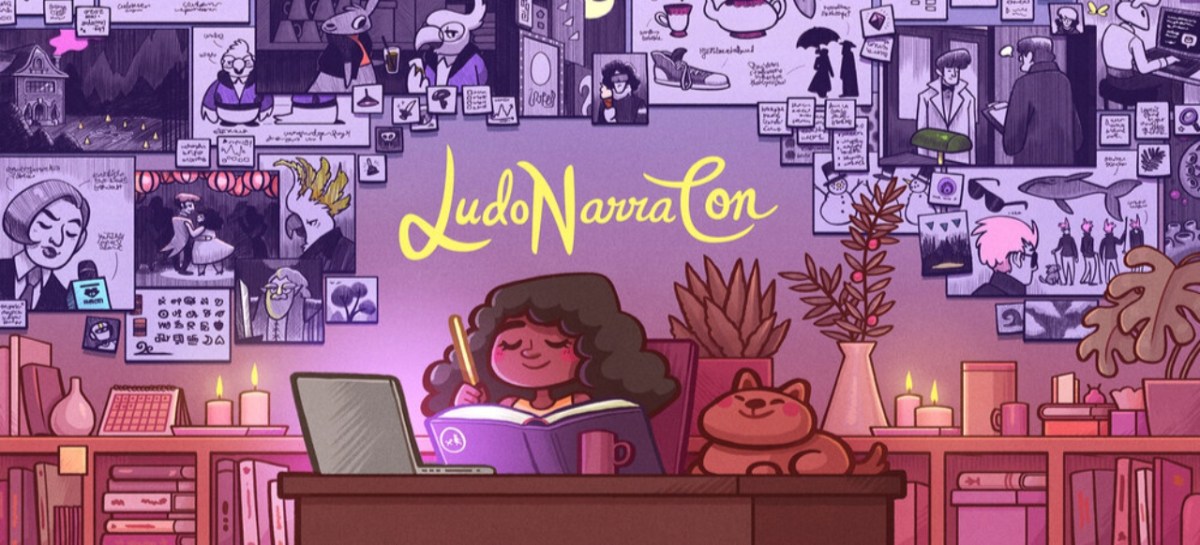„About the event
LudoNarraCon is a digital convention celebrating narrative video games, hosted on Steam. An initiative of indie label Fellow Traveller, it aims to create a platform to showcase and celebrate interesting and innovative narrative games, replicating as many of the aspects and benefits of the physical convention experience as possible within a digital format.
Game Booths
Over 40 developers and publishers will stream live on their games‘ Steam store pages with behind-the-scenes content, couch chats, and demo gameplay. Fans can get a look at the game without dealing with a crowded exhibition floor.
PANELS
Our main theatre stage on the event landing page on Steam is scheduled to air 12 hours of live panels with industry influencers. These will focus on (fun!) topics related to the narrative games genre.
All streams will go live at the launch of the con, and will then be looped through the remainder of the event, so no matter when fans „attend,“ they can enjoy behind-the-scenes content about exciting upcoming indie games.
Media Involvement
Media pass holders can access a press portal giving early access to press kits, media-ready demos, and interview opportunities
Event Sale
A LudoNarraCon Sale will be live on Steam during the event, with more than 50 story-rich games.
Personal Storytelling in Games
Indie games can have the flexibility and innovation to embed many personal tales from their lead creators. These game writers and creators discuss how their lived experiences lead them to write and direct games that are unflinchingly about their passions, perspectives, and questions in life.
Narrative Design: The Secret Sauce of Game Storytelling
Ever considered that writer and narrative designer are separate disciplines? What makes them unique? Join us in exploring this topic with the brains behind beloved videogame stories!
On Essay Games: The Diary, The Documentary, and The Satire
As video games communities continue to mature and nurture pockets of avant-garde exploration, this panel investigates emergent practices of game development/design called „essay games.“ Similar to the essay film and video genres of avant-garde cinema, essay games explore how the medium can tell critical, research-based narratives about political, cultural, or interpersonal themes. This discussion will outline three primary narrative design strategies that distinguish essay games from traditional independent games: the diary, the documentary, and the satire.
Let’s do the time warp again: how to keep the narrative interesting in a game built on repetition
Ever since Groundhog Day, time loop stories have captured the imagination of film makers and game developers alike. Time loop games offer players the unique ability to experiment, see the consequences of their actions, correct mistakes, and exploit knowledge they shouldn’t have – but all at the risk of becoming repetitive. In this panel, developers of time loop games (The Sexy Brutale, The Forgotten City, Elsinore, and Twelve Minutes) will discuss how to keep narrative interesting in a game based on repetition.
The Evolution of Game Narrative
This panel brings together some well traveled game writers and narrative designers to talk about how game stories have changed over the years and how they’re likely to evolve in the future. With decades of experience from text adventures (The Hitchhiker’s Guide to the Galaxy) to graphical adventures (Loom) to horror shooters (The Suffering) to strategy games (Jagged Alliance and the upcoming Empire of Sin) our lineup of panelists have worked in many different genres that embraced narrative in many unique ways. Join us for this panel and hear us explore where game narrative will go next!
Creating Emotional touchstones in Emergent narratives
Games have a unique ability to establish empathy between a player and a world and characters, but game players don’t always follow the path the narrative lays out for them. This panel discusses how designers and storytellers can build in empathic elements that can be found and engaged with even when the larger narrative gets delivered out of order.
Cultural Dissonance: Exploring and Learning the Unknown for Your Story
Three developers from three different parts of the world discuss their experience and lesson in making a narrative heavy game set in The United States with a heavy influence from Japanese media.
Localization AND WRITING: Re-creatiNG the worldS TOGETHER
Game writers and localizers will tell dramatic stories how cultural and language specifics challenged their work. How game worlds are transformed on the way from original language to localization. We will see what translation and writing have in common, and how narrative games evolve real life cultures through localization.
GAMES: THE TRANSFORMATIONAL EXPERIENCE
In this exciting panel we explore games and developers that utilize the uniquely powerful medium to create meaningful experiences about real world problems; provoking thoughts, increasing awareness and making an emotional impact to change the world for the better.
Holistic Storytelling
The creators of upcoming indie game Röki (Polygon Treehouse) discuss their approach to interactive narrative, namely ‚holistic storytelling‘. Video games are an interactive medium and a script is just one of the tools we have at our disposal to craft stories.
Emergent narrative VS traditional narrative
Daniele Giardini (aka Demigiant) is both a comic and game writer/artist—and a coder, game designer, UI/UX lover, tools developer: yes, sometimes he feels a little overwhelmed. He wrote Still There (for which he also developed the writing tools), drew Football Drama, made DOTween, Goscurry etc. He likes deranged perspectives, he doesn’t have a cat anymore.
Glen Pawley is the developer of Star Dynasties, a sci-fi empire management strategy game with a procedurally generated narrative of human drama and feudal politics. Trained as a software engineer, he has a long history of building complex systems and is putting that to use in designing an emergent narrative engine of the life stories of the nobility in a decaying human civilization.
Pietro Polsinelli is a game writer, designer and developer. Created Football Drama, now working on Roller Drama, both sports games blending narrative and management. He also works on applied games and is a researcher on „games for health“ at Milan Bicocca University.“

